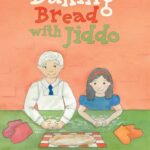Baking Bread with Jiddo by Carrie Maslen

Published by Stirred Stories on May 16th, 2024
Key Words: Immigration, Family, Baking, Memories, Traditions
Summary: A young girl and her family visit her Jiddo (grandfather) every summer. In the early mornings, she enjoys being her Jiddo’s little helper while baking bread. During these baking sessions, her Jiddo tells her stories from when he was a small boy in Lebanon, sailing to America with his family, or even about meeting her Grandma. But one day, he wakes up with a bad cold, and the young girl, while hesitant at first, bakes the bread like Jiddo taught her, and although the first batch burns, she keeps trying and eventually bakes bread for the whole family.
Book lesson: There are a couple of lessons in this book, the first is teaching kids to be independent and keep trying even if they do not succeed. Another is the importance of spending time with your family to learn traditions and stories from the past about your family’s history, especially in the case of the young girl, learning about her family heritage in Lebanon.
Censorship: Not banned or censored
Highlights: The highlights were the different stories that her Jiddo told the young girl about when he was a child in Lebanon, as this gave the story a more serious meaning about immigration, and more context about the family. My personal favorite was a story about him picking peaches for breakfast, then going to swim in the village’s stream, as it depicted an ordinary day in her grandfather’s childhood, but it had a deep meaning to him.
Children’s identity: Baking Bread with Jiddo illustrates different traditions to readers, allowing insight into how a Lebanese family bakes bread in the early morning, fostering cultural awareness. The story also showcases immigration in a significant way, not becoming the central point of the story, but remaining an influential point that continues to inspire the young girl. It highlights that while immigration is always complex, it is significant to remember traditions and stories.
Sense of Family: It is clear throughout the narrative how close this family is and how much every member values spending time with others. An example of the strength of family relationships is how the young girl prioritizes waking up early to spend time with her Jiddo.
Sense of Culture: The bread-baking portion of the story showcases the sense of Lebanese culture, and teaching it to the young girl represents the ability to pass it down to different generations.
Sense of Change: When the young girl Jiddo falls ill, it forces her to make changes and take on new challenges, such as baking the bread alone. While she burns the first loaf, the young girl does not give up; instead, she keeps trying and is able to adapt to the change.





